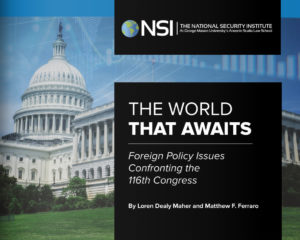
February 7, 2019
Contact: Jessica Jones
jjones76@gmu.edu
703-993-8061

Arlington, VA – On February 7, 2019, the National Security Institute (NSI) at George Mason University’s Antonin Scalia Law School published its latest NSI Law and Policy Paper — “The World That Awaits: Foreign Policy Issues Confronting the 116th Congress.” The paper is authored by NSI Visiting Fellow Loren Dealy Maher and NSI Visiting Fellow Matthew F. Ferraro, and will be briefed to Congress at a public event later this month; date to be determined.
This Law and Policy Paper:
- Introduces the immediate challenges found in Africa, the Americas, Asia, Europe, and the Middle East that are making headlines today and considers how these issues contribute to the larger picture of global affairs in 2019.
- Addresses recent developments that are driving policy decisions confronting the 116th Congress.
- Anticipates the key questions that Congress will need to consider for these regions in the coming year.
The authors highlight the top considerations for the 116th Congress:
- Africa: How will Congress weigh-in on the administration’s efforts to balance between ongoing counterterrorism efforts, new development priorities, and the need to counter China’s growing economic advantage across the continent?
- Americas: Will Congress approve NAFTA’s replacement, the United States-Mexico-Canada Agreement, and how will it respond to the dramatic geopolitical shifts at play in Brazil and Venezuela?
- Asia: Can Congress work with the administration to create a bipartisan grand strategy to address the rapidly expanding geopolitical rivalry with China, and will it support the administration’s negotiations with North Korea?
- Europe: How should Congress respond to the administration’s NATO policy, the grinding gears of Brexit, and the continued threats posed by Russia?
- The Middle East: How will Congress respond to the administration’s decision to reduce U.S. military presence in Syria and Afghanistan? Will it reconsider the U.S.-Saudi relationship? How far will the U.S. take its “maximum pressure” campaign against Iran, and how should it respond if Iran ends its adherence to the nuclear deal?
The full paper is available HERE.
Comments from the authors and NSI Founder:
Loren Dealy Maher: “The pace of change around the globe today is staggering. Every region is experiencing a major shift in its economic, political and security posture, and the decisions made by Congress in the coming year will play a significant role in determining the shape of world affairs for generations to come.”
Matthew F. Ferraro: “As we enter this period of consequences — with major decisions looming on issues ranging from NATO to the new NAFTA, from Korea to China, from Afghanistan to Syria — the essential question for Congress is the extent to which the first branch should seek in its own right to shape American foreign policy. In other words, the world that awaits is one in which Congress has the opportunity to make its impact on international affairs felt to an unusually significant degree.”
Jamil N. Jaffer: “The newest NSI report on foreign policy issues for the new Congress is our first foray in presenting a wide swath of issues for consideration by policymakers and it is a tour de force; this isn’t surprising given the authors’ combined experience in the intelligence community, at the National Security Council in the White House, the Department of Defense, the State Department, and on Capitol Hill.”
About the National Security Institute
The National Security Institute serves as a platform for research, teaching, scholarship, and policy development that incorporates a realistic assessment of the threats facing the United States and its allies, as well as an appreciation of the legal and practical challenges facing U.S. intelligence, defense, law enforcement, homeland security, and cybersecurity communities. NSI draws on the experience of its visiting fellows, as well as its highly distinguished advisory board and faculty, to produce timely research and policy materials that deliver insightful analysis and actionable recommendations to senior policymakers in the White House and key departments and agencies, as well as those on Capitol Hill.
About George Mason
George Mason University is Virginia’s largest public research university. Located near Washington, D.C., Mason enrolls more than 33,000 students from 130 countries and all 50 states. Mason has grown rapidly over the past half-century and is recognized for its innovation and entrepreneurship, remarkable diversity, and commitment to accessibility.
About the Scalia Law School
The Antonin Scalia Law School at George Mason University is defined by three words: Learn. Challenge. Lead. Students receive an outstanding legal education (Learn), are taught to critically evaluate prevailing orthodoxy and pursue new ideas (Challenge), and, ultimately, are well prepared to distinguish themselves in their chosen fields (Lead). It has been one of America’s top-ranked law schools for the last fifteen years.
